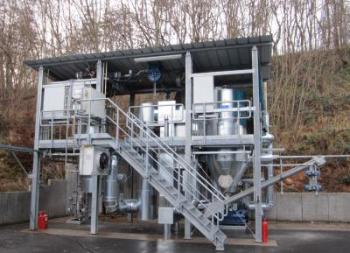Mar 8 2013
A great deal of powder is needed to coat auto parts and other objects – and a great deal of waste is left over afterward: After all, only a fraction of the coating ends up on an autobody; the rest misses the target and is suctioned away.
 This pilot plant in Gerstungen recovers energy from fine grained production residues. Credit: Fraunhofer IFF
This pilot plant in Gerstungen recovers energy from fine grained production residues. Credit: Fraunhofer IFF
Recycling of residual powder has limits: If coaters mix in too much "recycled" powder, the quality of a coating suffers. Companies therefore dispose of most of the coating powder – an expensive undertaking. Grinding processes are similar: They also produce many residues and companies have to dig deep in their pockets to dispose of them.
In the future, industrial plants will be able to cut such disposal costs as well as heating costs for facilities, kilns and many other high-temperature processes. This is being made possible by a plant, which researchers at the Fraunhofer Institute for Factory Operation and Automation IFF in Magdeburg developed in cooperation with an industry partner. "The plant we developed enables us to recover heat from any combustible, powdery industry waste, whether it is coating powders, polymer powders or even wood constituents," says Marcus Kögler, in charge of the project at the Fraunhofer IFF. "The potential savings are large: 25 percent of the natural gas usually used for heating and, additionally, 100 percent of the disposal costs are being saved at a reference facility. A plant with a larger capacity can even produce electricity that can be supplied to the electrical grid.
An Ideal Burner for Small Quantities of Waste
The plant consists of three basic units: a pulverized fuel burner, a boiler and a filter system. Powdery waste is conveyed into the burner pneumatically, i.e. with compressed air, where it is agitated systematically, brought into contact with air and burned. Water stores the heat produced and thus heats facilities or kilns. The flue gases produced during combustion are suctioned off and purified in the filter system. The pulverized fuel burner is approximately 50 times smaller than conventional models and thus has only approximately two percent of their capacity. The advantage: This also makes the burner worthwhile for smaller quantities of waste, like those produced in small and medium-sized enterprises. "In order to be able to compute the temperature distributions and flow paths in this small burner, we first ran CFD (computational fluid dynamics) simulations," says Kögler. These simulations answered numerous questions for the researchers, thus helping them develop the burner: How do the powder particles flow in the burner? How can they be agitated optimally? How can the lowest emission levels be achieved? In another step, the researchers further optimized the burner's settings and parameters in experiments.
A pilot plant is already operating at MBG Metallbeschichtung Gerstungen GmbH. It cuts the natural gas used by one quarter. The company holds a patent on the process for the recovery of heat from powder residues from coating plants, which was granted in conjunction with this project. The researchers from the Fraunhofer IFF customized the pilot plant specifically for the company's requirements. The researchers have to modify each new plant for the requirements, depending on what powder is produced in a plant. In other words, they have to engineer the pulverized fuel burner's combustion system for the size of the particular particles and design the filter system so that it optimally filters each of the flue gases produced out of the air. Learn more about the recovery of heat from residues, entrained flow combustion and the pilot plant from the Fraunhofer IFF's experts at the Hannover Messe (Hall 2, Booth D18) from April 8 to 12.